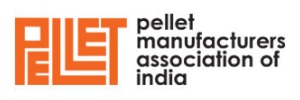About Pellet Manufacturers’ Association of India (PMAI)
PMAI is the official industry body of Pellets Manufacturers in India. It was set up in March 2013 with a fundamental premise to have a common forum for its members to share and exchange each other’s views and problems, to promote and protect the interests of the Indian Pellet Industry, including all its stake holders. PMAI members include stand-alone Pellet plants as well units producing down – stream products like Sponge iron and finished Steel.
The Association, in its multi-dimensional role, represents the Indian Pellet Industry and provides a common platform for regular interface with the Government of India and other regulatory authorities.
The Association concentrates on market development, compilation and dissemination of industrial data and technical and commercial information, relevant to the pellets industry in the overall value chain from mines to Steel. PMAI endeavors to provide essential information for decision making in the current fast changing business environment.
In the current economic scenario, the Association maintains a coherent plan, which represents in totality, the requirements and concerns faced by the Pellet industry.
PMAI plays a significant role in order to project and ensure the continued development and growth of the pellet industry in India.
Genesis of Pellet Industry in India
The Pellets industry started in India during the 1960s with the setting up of Mandovi Pellets plant in Goa. Subsequently a PSU, namely Kudremukh Iron Ore Company Ltd (KIOCL) set up the first 3 MTPA large scale pellet plant in Mangalore in 1987. Later on the capacity was increased to 4 million tons per year. Pellet plant at Tata Steel came up in 1980s.
The Government of India gave a big fillip to the Pellet Industry with a view towards conservation of iron ore resources by giving incentives in the form of Policy recommendations like:
- In order to encourage this industry, the Hon’ble Union Finance Minister in Budget Speech of 2011 -12 at Sl.No.164 stated the following –
“Iron ore is also exported in a value-added, pelletized form. Full exemption from export duty is being provided to iron ore pellets to encourage the value addition process for fines”.
- Further, in the Budget Speech of subsequent year (2012 -13 at sl. No. 191), he also stated:
“To encourage enrichment of low-grade iron ore, of which we have huge reserves, I propose to reduce basic customs duty on plant and machinery imported for setting up or substantial expansion of iron ore pellet plants or iron ore beneficiation plants from 7.5% to 2.5%”.
Thus, establishing Government’s policy statement supporting development and ensuring capital investment in iron ore Pellet industry in India. This led to setting up of a large number of pellet plants during the past 5 to 6 years. India is now among the top pellet producers in the world.
Pellet is an integral part of Iron and Steel Industry. With the help of Government of India initiatives, Pellet industry capacity was initially increased to 22 million tonnes in the year 2011. Capacity addition to place in the last 5 years, surging to the present capacity of 91 million tonnes. In addition, Beneficiation capacity of 112 million tonnes has been set-up with the latest technologies to upgrade low grade Iron ore fines. The total investment in setting up Pellet as well as Beneficiation plants is the tune of Rs. 45,000 Crores. The Pellet Industry provides direct employment to around 100,000 people in some of the most backward states of India. In view of the tremendous advantages of use of Pellets, Steel industry in India is planning to add 28 million tonnes of pellet capacity.
The Pellet industry gives a significant amount of revenue to the national exchequer by way of excise and other taxes. With the rising trend in export of Pellets, the industry gives the country valuable foreign exchange.
